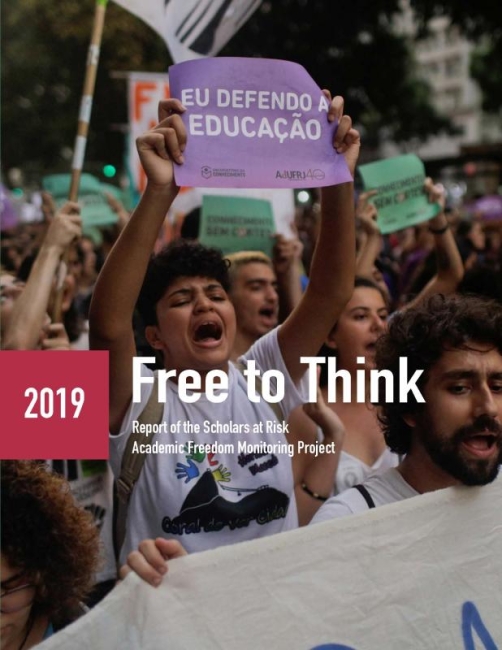You have /5 articles left.
Sign up for a free account or log in.

Courtesy of Scholars at Risk
Violent attacks on student expression globally. Political tensions boiling over onto campuses in worrying ways in India. Increasing pressures on academic and personal freedoms in China, and new pressures in Brazil. Continuing prosecutions of faculty in Turkey. The use of lethal force to squash dissent among students and faculty protestors in Sudan.
These were a few of the key themes and topics highlighted in Scholars at Risk’s "Free to Think" report, the fifth in an annual series of reports on attacks on higher education institutions and the students, faculty and staff who make up these institutions worldwide.
The report from the Academic Freedom Monitoring Project at Scholars at Risk, a network of more than 500 higher education institutions that assists in securing academic placements abroad for threatened scholars, is based on the organization’s analysis of 324 reported attacks on higher education institutions or their students or personnel across 56 countries that took place between Sept. 1, 2018, and Aug. 31 of this year.
Categories of attacks identified by SAR include violent attacks, killings and disappearances; cases of wrongful imprisonment or persecutions; cases of loss of academic position or expulsion from study; and travel restrictions preventing the movement of scholars and students across borders.
Of the most serious category of attacks, those involving physical violence, Scholars at Risk reported 97 violent incidents in 40 countries, which resulted in deaths of at least 32 students, staff, campus security personnel and others, with many more injured.
These included coordinated attacks by nonstate actors and groups on institutions, in several cases involving explosives, in Afghanistan, Ecuador, Sudan, Thailand, the United Kingdom and Yemen, as well as seemingly targeted attacks on individual students and scholars. For example, Khalid Hameed, a professor of English at Pakistan’s Government Sadiq Egerton College, was killed in March, allegedly by a student in apparent retaliation for the professor’s role in organizing a coeducational event.
The report also includes a heavy focus on attacks on student activism and protest, which account for more than 100 of the incidents analyzed in the report and span a large number of countries. SAR reports that violent responses to student expression by state or private security forces led to at least nine student deaths and more injuries during the reporting period. In addition, more than 280 students were arrested, detained or prosecuted for their activism, frequently on grounds related to terrorism, insulting the government or unlawful assembly. Higher education institutions have also suspended, expelled or imposed other disciplinary sanctions on students for their expressive activities.
“Violent and coercive attacks on student expression are one of the most frequently occurring subsets of incidents reported by the monitoring project,” the “Free to Think” report states. “This year, hundreds of students were killed, injured, arrested, or subjected to other coercive force by state and non-state perpetrators in connection with their expressive activity. Such attacks threaten the future of strong, nonviolent student movements, which are important to understanding contemporary issues and to the development of future leaders.”
Other themes and topics highlighted in the “Free to Think” report include:
Violent clashes on Indian campuses involving both rival student groups and off-campus actors. “National political tensions in India have manifested in numerous incidents on campus,” the report states. “In a number of cases, incidents have turned violent, resulting in injuries to many students and university personnel, damage to university property, and campus closings. In addition, authorities have arrested scholars and students, both individually and en masse (with the numbers of detainees estimated in the hundreds); and several scholars and students have suffered professional or academic retaliation for critical expression. While these types of incidents are not necessarily new, the volume of attacks in India in recent years warrants a closer look at challenges facing scholars and students in the country.”
Ongoing attacks on scholars in Turkey, including the prosecutions of scholars known as Academics for Peace for their signatures on a January 2016 petition calling for a resumption of the Kurdish peace process. (In a positive development for these scholars, Turkey’s constitutional court ruled in a 9-to-8 verdict in July that prosecutions of 10 of the signatories on terror-related charges violated their rights.) Apart from the ongoing issues specific to the Academics for Peace, the report notes that thousands of academics in Turkey remain in a state of “civil death” -- fired from their academic positions, barred from future public employment and unable to leave the country -- after being accused of having alleged links to Fethullah Gülen, the Islamic cleric whom the Turkish government blames for a failed July 2016 coup attempt (Gülen has denied involvement).
Closures of Sudanese universities and crackdowns on protesting faculty and students. SAR reports that the Sudanese government ordered the closure of Sudanese universities in December 2018 in an attempt to quell protests of the government of former president Omar al-Bashir. Hundreds of protesters, including students and scholars, were detained or arrested. After al-Bashir's ouster, via a military takeover in April, paramilitary forces violently cracked down on protests demanding a civilian-led government. On June 9, paramilitary forces reportedly raided the University of Khartoum, resulting in deaths of four protesters and the burning of a university hospital.
A “spike” in attacks on academic freedom in China. “Over the past year, SAR has reported a spike in reported attacks on scholars and students in the People’s Republic of China (PRC) aimed at eliminating dissent and restricting the flow of ideas,” the report states. “Scholars have been arrested, prosecuted, and targeted with disciplinary measures, including dismissal, for their research, teaching, and online expression. A resurgence of student activism, not seen on the mainland since the 1989 Tiananmen Square protests, has been met with swift punishment by police, with a growing number of students detained and some disappeared. Meanwhile, authorities continue the mass detention of members of China’s ethnic minority communities, including many scholars and students, at so-called 're-education' camps scattered throughout the Xinjiang Uyghur Autonomous Region.”
New threats to academic freedom in Brazil. The report also highlights what it characterizes as “significant pressures on Brazilian higher education” that increased in the lead-up to and following the October 2018 presidential election, which resulted in the election of a right-wing candidate, Jair Bolsonaro. "Free to Think" documents several incidents involving violent threats and attacks against students and faculty -- including various incidents targeting racial minority students, LGBTQ+ students and faculty who research gender studies and public policy related to policing and drug legalization -- in the lead-up to and aftermath of the election.
Daniel Munier, SAR's senior program officer for advocacy, said that SAR has received 40 requests to date from Brazilian academics for assistance, all but four of which have come in since the October 2018 presidential election.
"I don’t think we can do a good enough job emphasizing how pervasive this problem is, of attacks on higher educational communities," Munier said in an interview. "It’s truly a global problem. We’re not just seeing it in closed societies or places where you have authoritarian regimes, but we’re seeing it all over the world."






